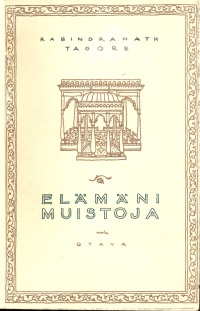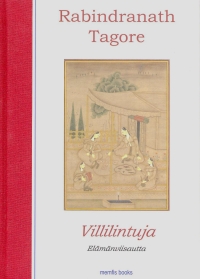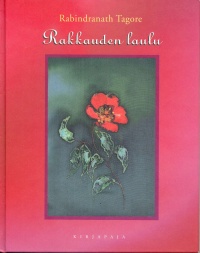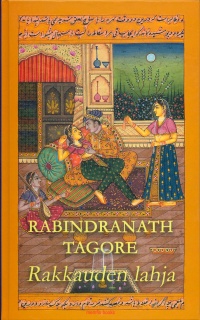In Phalgun, One Night
(Rabindranath Tagore in
Finland)
Hannele Pohjanmies
Characters:
Buddhadeva Bose, a Bengali poet (1908-1974) and Hannele Pohjanmies, a
Finnish translator; the narrator of the story
Time:
Phalgun, the end of February 2008
Scene:
A road in a forest
One night in the Land of All-I-Have-Found1 I
happened to meet the poet Buddhadeva Bose.
“O hi, I was hoping to see you, there’s
something I want to tell you,” I said to him.
“Thank you for your poems! And thank you so much for that wonderful book
of yours, ‘Tagore: Portrait of A Poet’! You see, I have been translating his
poems into Finnish…”
“You have?” he said. “You speak Bengali?”
“No, I translate the English ones. I do not
think anyone has translated them into Finnish from Bengali, at least not many
of them. There are not many people who speak Bengali in
“
“I
know, of course I know! I have translated it, too, but it has not been
published yet! My mother remembered having heard it on the radio during the
war, at the beginning of the 1940’s, I do not know if it could have been
possible.”

Tr. of Gitanjali by Eino Leino
“It is a famous poem, and that’s why many
Bengalis know about
“Yes. But the Finnish people do not know
about the poem and they do not know Rabindranath very well, either. I was
surprised to find that poem for the first time. It was wonderful that he had
been thinking about
“With compassion,” says Buddhadeva.
“Yes…I have to admit, in secret I have been
imagining that perhaps
“He has written about birds in rather many
of his poems, actually.”
“So have you! You know, I have translated
several poems of yours in Finnish, too, and you speak about birds in almost
every one of them!”
“Really?”
“Well, maybe I just have chosen the ones,
where the birds are flying or calling. But, on the other hand, is there
anything more important than the birds, especially the migratory birds?”
“I do not know,” he smiles. “But how come
you have translated us, Rabindranath and me?”
“We had Tagore’s poems on the bookshelf at
home when I was a child. The translated Finnish collections, all two of them.
And when I was little, I liked the poems of ‘The Gardener’, but I did not understand the ones
of ‘Gitanjali’. My parents were theosophists and they were talking about Indian
religions quite often. They were artists. My father was a composer and writer
and my mother an eloqutionist, so I heard poems all the time.”
“Sounds like an artists’ home…”
“In fact, it was a farmhouse, and I used to
work hard in the fields and with the cattle since I was five. It has been a
great help now that I have translated Tagore’s poems, ‘close to the land’. Our
family ordered a farmers’ magazine, and once, in the year 1962, there was a
whole page article about Rabindranath, with pictures. I still have it saved.
There was even a picture of Padma, his boat.”
“It was the same year that my book was published,
the one about Tagore,” Buddhadeva says.
“You mean this,” I say, and dig a book from
my bag – a slender book with white covers. “I have this always at hand. There
is something about it. But no wonder, I do not get rid of your poems, either!”
“So where did you find them?”
“I wrote an e-mail to Ketaki Kushari Dyson
to ask some things about Tagore and she had recently translated your poems in
English, a whole big collection with a remarkable foreword…”
“Ketaki?”
“Oh, you might have met… now there’s a lady!
She knows so enormously much about everything. She has travelled around the
world to study the life of Rabindranath and translated his poems in English, I
also have that book near me all the time… She also wrote a fine book about
Victoria Ocampo and Tagore. It is quite a thriller!”
I look at Buddhadeva for a moment, lost in
thought.
I continue, “I think there might be
something she would like to ask you. If you two meet, I’d like to be a fly on
the wall and hear your conversation. It was from her that I heard about your
poems and then I ordered the collection that she had translated and started to
read it. The poems started bothering me and they were difficult, your world is
so different from Tagore’s…”
“Of course it is different! A whole
different era!”
“Then I came to that ‘
“So have you been in
“No, but I have met other Calcuttas in my
life.
He is silent.
“But there is some similarity in your poems,
Tagore’s and yours,” I say. “The centre of everything in them is the heart. I
have counted it in Tagore’s poems – ‘heart’ is the word that occurs especially
often in them, more often than ‘flowers’, ‘song’, ‘earth’ or ‘stars’.”
“In my poems, too?” Buddhadeva sounds surprised.
“I have not counted, but it doesn’t have to,
it is in the centre anyway. And so too, it is in this book, that you have
written about him.”
I open the book and leaf the pages. “I have
been thinking about his personality so much. His poems are like a warm sea
current…on the other hand, I can feel two levels in them, one high in the
spheres and another deep under the earth. And then I find this in your book,
you write about Tagore: ‘I do not think of him as a tract of land where
edifices are built and tunnels forged through mountains, but as a stretch of
water, changeable, continuous, always on the move, cool and bland when you
first get down into it, but with depths and hidden currents which can sweep you
away unless you are wary.’ I love this! I love these sentences! I could plunge
into them and swim in them!”
He listens, with a little smile on his face.
“And hear this, you write in an other place:
‘---I have the awful feeling that if Tagore had not existed, I as I am today
would not have existed either. --- I am inclined to say that we of our
generation owe more to Tagore than can be expressed in words; for it now seems
that the rain-cloud or sunset made us pause and ponder just because he had told
us they were beautiful; and it was he who had sharpened our sorrows and refined
our joys, and taught us to be individuals and not mere units in a society, and
to whisper that terrible word, ‘ love’.”

Tr. of My Reminiscences
by J. Hollo. Otava
“Are you in love with him?” he asks.
“I am in love with his poems. Well, I fell
in love once while reading one of his biographies, not in him, but the writer
who was his son Rathindranath. What a warm-hearted writer! Such a beautiful
text! Do you think that the Bengalese really are different from other people
after having lived among the poems of Rabindranath?”
“Have you met any of them yourself?”
“I have been in correspondence with Ketaki
Kushari Dyson, she is fantastic, always
so kind and helpful, but I have only met one in person, a young woman who is
studying in
Buddhadeva does not say anything. He looks
sad. It is quiet.
“I am sorry for your wife,” I whisper. “It
was so sad she got ill. I have read your memoirs on your visit in Santiniketan
to see Rabindranath. He had so many sorrows in his life, also…”
“Have you ever thought, what you would say
to him if you met him?
“Oh, that is a huge question. If I suddenly
met him on the road I would probably say: Is it really you? Would you have a
moment…? You see, I am your Finnish translator, I translate your English poems…
Thank you so enormously much for everything, for all the poems, especially the
songs! There is something miraculous in them! You have seen something that is
floating in the air, unseen by the others, and you have gathered it in your
songs, between the lines. There is invisible music in them!”
“Invisible music?” Buddhadeva breaks in.
“And I would tell him not to regret his
English poems, they have given much delight to so many people. And I would say
that I am sorry he had so much sorrow in his life, and that I admire his
courage and strength. How, in spite of everything, he just went on. And finally, I would thank him
especially for all the poems where he encourages people.”
I think for a moment.
“I think he was quite often afraid, since he
wrote so many encouraging poems. I see him as very vulnerable and inconsistent
deep inside, but that does not prevent one from writing fine poems. Anyway, it
is worthy of respect, if someone does courageous things even if one is afraid.
Don’t you think he was rather lonely? There was pain behind the beauty, perhaps
for all his life.”

Tr. of Stray Birds by Pertti Seppälä
Buddhadeva looks at me, musing.
“The flowers in
“Is that not love?”
“Well, yes…and compassion, too. Ah, his
poems…I totally agree with you about this: ‘In the deep shadows of rainy July,
with secret steps, thou walkest, eluding all watchers – ‘ Or how about this:
‘Do not call him to thy house, the dreamer, who walks alone by thy path in the
night. – “
 Tr. of A Song of Love, a selection by Hannele Pohjanmies |
 Tr. of Lover's Gift by Hannele Pohjanmies |
“I am trying to write about you in
“Did he win? The referendum?”
“No, the Field Marshal won; he led the
Finnish army against the Soviet Union during the war, so that
“So here’s the poem ‘Apaghat’ again,”
Buddhadeva says. “
“Yes… A couple of years ago two Finnish
young women collected an anthology of erotic poems, they placed two poems from
‘Gitanjali’ in it. In an old detective story there is a sailing yacht by the
name Gitanjali… But Tagore is highly respected here, anyway. People admire his
cosmopolitanism, it has received attention from a very high level recently. A
professor of history has spoken a lot about it. In any case, I think that the
West is not a homogenous culture, with the same image of Tagore everywhere. The
East is not homogenous, either.”
Buddhadeva looks confused. “A short summer?
And you like short poems?”
“It is an ecological question. The Finnish
people are slow… there is no sense in wasting energy in a cold climate. They
are shy and do not talk much. But they like sentimental songs and love to dance
tango. There are not very many of them, maybe only as many as the Santhal-people in your
country. The winter is very long and dark, and that is why the summer is such
an important thing. It only lasts for a moment!”
“And you would bring a wreath of summer
flowers to Rabindranath! What about me?”

Tr. of Fruit Gathering
by Hannele Pohjanmies
“If you could hear the birds singing in the
lucid summer night, when the migratory birds have come back! If one of them
would have dropped a feather, I would hand it to you.”
I put the book back into my bag. “Now I have
taken up a lot of your time… it was so nice to meet you! Thanks again for
writing this book. Remember, the beginning of June is the best time to visit
Buddhadeva smiles. “Thank you, and have a
good journey!”
*
The
main sources:
Bose, Buddhadeva: Tagore: Portrait of A Poet. Papyrus,
Das, Sisir Kumar (Edited): The English
Writings of Rabindranath Tagore. Volume One: Poems. Sahitya Akademi,
Dyson, Ketaki Kushari: In Your Blossoming
Flower-Garden. Rabindranath Tagore and Victoria Ocampo. Sahitya Academi,
Jiménez, Juan Ramón: Platero and
Tagore, Rabindranath: I Won’t Let You Go.
Selected Poems. Translated by Ketaki Kushari Dyson. UBSPD,
Tagore, Rabindranath: Selected Poems. Translated
by William Radice. Penguin Books,
Tagore, Rathindranath: On the Edges of
Time. Visva-Bharati, Kolkata 2003 (First Published 1958).
The Selected
Poems of Buddhadeva Bose. Translated and Introduced by Ketaki Kushari Dyson.
from his English collection ’Poems’ (1942)
translated by Hannele Pohjanmies
I
Älä kutsu häntä kotiisi, uneksijaa,
joka kulkee yksin polullasi yössä.
Hänen sanansa ovat kotoisin vieraasta maasta,
ja vieras on sävel
jota hän soittaa yksikielisellä luutullaan.
Älä turhaan valmista hänelle leposijaa,
hän lähtee pois jo ennen aamunkoittoa.
Sillä vapauden juhlassa
häntä on pyydetty laulamaan
ylistystä vasta puhjenneelle valolle.
Do not call him to thy house, the
dreamer,
who walks alone by thy path
in the night.
His words are those of a strange
land,
and strange is the melody
played by him on his one-stringed
lute.
There is no need for thee to spread
a seat for him;
he will depart before day-break.
For in the feast of freedom
he is asked to sing
the praise of the new-born light.
II
Hyväile silmilläsi värejä, jotka kareilevat
kauneuden virrassa,
on turhaa yrittää ottaa niitä kiinni.
Intohimosi ajaa takaa pelkkää varjoa,
elämänkieliäsi jännittää vain musiikki.
Viiniä jota jumalat juovat kokouksissaan,
ei voi mitata, ei koskettaa.
Se on juoksevissa puroissa,
kukkivissa puissa,
hymyssä joka tanssii tummien silmien kulmissa.
Nauti siitä, täysin vapaana.
Fill your eyes with the colours that
ripple
on beauty’s stream,
vain is your struggle to clutch
them.
That which you chase with your
desire is a shadow,
that which thrills your life-chords
is music.
The wine they drink at the assembly
of gods
has no body, no measure.
It is in rushing brooks,
in flowering trees,
in the smile that dances at the
corner of dark eyes.
Enjoy it in freedom.
III
Aamun valon sydäntä kouristaa
eron kipu.
Runoilija, ota huilusi!
Jos sinun on lähdettävä, olkoon niin.
Jätä kukkasille laulusi
kasteenkosteassa syksyssä.
Samanlainen aamu saapuu kerran jälleen
idän kullanhohtoiselta rajalta,
kiharoissaan kundan kukkia.
Kun kyyhkysen valittava kujerrus
kuuluu
varjoisalla puutarhapolulla
ja kaikki on täynnä vihreän hyväilevää taikaa,
silloin nousee mieleen tämä valo uudelleen:
hänen kevyet askeleensa kilisevät yhdessä
laulujesi
nilkkarenkaan kanssa.
Jos sinun on lähdettävä, olkoon niin.
The morning-light aches
with the pain of parting.
Poet, take up thy flute!
Let be, if thou must depart, and go,
leaving thy song to the flowers
in this dew-dripping autumn.
Such a morning will come again
at the gold-tinted border of the
East
with kunda flowers in her locks.
In the shady garden path, plaintive
with dove’s cooing,
tender with the caressing enchantment
of the green,
will rise again the vision of this
light,
her steps tinkling with the anklet
of thine own songs.
Let be, if thou must depart.
The
works of Rabindranath Tagore in Finnish
The poems:
Puutarhuri (The original: The Gardener,
1913). Translated by Eino Leino. Otava 1913, 1924, 1967.
Uhrilauluja (Gitanjali, 1912).
Translated by Eino Leino. Kustannusosakeyhtiö Kirja 1917, reprinted by Werner
Söderström Osakeyhtiö 1989 (entitled ’Lauluja’).
Villilintuja (Stray Birds, 1916). Translated by Pertti Seppälä. Memfis Books 2001.
Rakkauden
laulu (A
Song of Love, a selection). Translated
by Hannele Pohjanmies. Kirjapaja 2002.
Rakkauden lahja (Lover’s Gift, 1918). Translated by
Hannele Pohjanmies. Memfis Books 2006.
Hedelmätarha (Fruit-Gathering, 1916).
Translated by Hannele Pohjanmies. Memfis Books 2007.
(On the way:)
Tähtitaivaan runot (Poems, 1942). Translated by Hannele
Pohjanmies. Memfis Books 2008.
Toiselle
rannalle (Crossing,
1918). Translated by Hannele Pohjanmies. Kirjapaja 2009.
Other
works:
Haaksirikko (The Wreck, 1921).
Translated by J. Hollo. Otava
1922.
Koti ja
maailma (The
Home and the World, 1919). Translated by J. Hollo. Otava 1922, 1937.
Ahnaat paadet ja muita
kertomuksia (Hungry Stones and
Other Stories, 1916). Translated
by J. Hollo. Otava 1923.
Elämäni muistoja (My Reminiscences, 1917). Translated by J. Hollo. Otava 1923.
Pimeän
kammion kuningas ja muita draamoja (The King of the Dark Chamber and Other
Plays, 1914). Translated by J. Hollo. Otava 1924.
Gora (Gora, 1924) Translated by
J. Hollo. Otava 1925.
Sadhana (Sadhana, 1914). Translated
by J. Hollo. Otava 1926, 1967.
Persoonallisuus (Personality, 1917).
Translated by J. Hollo. Otava
1928.
Ihmiskunnan
uskonto (The
Religion of Man, 1931). Translated by Heikki Eskelinen. Biokustannus Oy 1990.
1 Title of Buddhadeva Bose's Sab Peyechhir Deshe, an account of Buddhadeva's visit to Santiniketan. Its translation is being serialized in Parabaas by Nandini Gupta as The Land Where I Found It All.
Published in Parabaas May, 2008

©2008 Parabaas